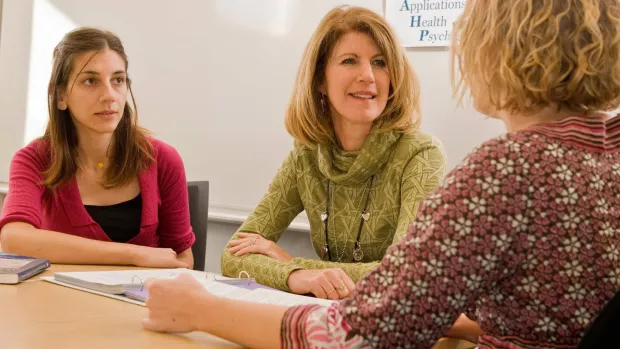
When psychological support is personal and professional
PhD student Hannah Morris-Bankole and psychologist Dr Laura Allen both live with relapsing remitting MS. They met for the first time and discussed how different therapy styles could be beneficial for people with MS at different times.
“Without my own training, I'd have been in a difficult position,” says Laura. She wasn’t offered psychological support when she was diagnosed with MS. But she was already a trained psychologist and counsellor who works with people with long-term health conditions.
Hannah was diagnosed with MS while studying for her psychology degree. She remembers she was handed “a load of booklets” by a healthcare professional. There was information about psychological support, but more focus on physical symptoms. So her research now focuses on MS.
Both Hannah and Laura found their psychology studies supported them with the uncertainty of an MS diagnosis. Now their lived experience continues to influence their research.
I wish I'd known when I was diagnosed, you do need professional support. It's just not offered.

What stops people with MS seeking professional support?
In her PhD research, Hannah’s found only around half of the people involved were seeking professional mental health support. Some people don’t seek any support at all and she wants to find out why.
Hannah remembers being overwhelmed with worry when she was diagnosed - “I wish I'd known when I was diagnosed, you do need professional support. It's just not offered.” She didn't think about her emotional needs or know where to go.
Her research shows one barrier is the stigma some people feel around therapy. Some might be embarrassed to admit they need professional help.
She explained another major barrier is not knowing what therapy options you have. Laura sees the same thing in her clinic. Many clients don’t know the types of therapy they could try.
Read more about MS and mental health
Overcoming stigma and exploring therapy options
Hannah found once people overcome the barriers and access one type of support, they’re keen to explore other sources. Even opening up to people close to them makes it easier to seek support from professionals.
Laura thinks trying therapy for the first time creates “open-mindedness”. She says “in a first session, everyone’s nervous”. And once her clients start to benefit, they are more open to embracing possibilities of other types of therapy.
Grief doesn't have to be about death, but about transitions in life, or about a loss of something.

The right approach at the right time
Hannah’s findings suggest people living with MS can benefit from different therapy styles at different times.
She found people were often advised by professionals to use CBT. But their experience was often more positive when it wasn’t the first therapy style they tried.
Her research aligns with Laura’s clinical experience. When Laura has a client who’s newly diagnosed with a long-term health condition, her tactic is to start with something called Acceptance and Commitment Therapy (ACT) and move on to techniques like CBT later.
Laura sometimes approaches the stage of diagnosis similar to how she’d approach grief. She says “Grief doesn't have to be about death, but about transitions in life, or about a loss of something.”
They both agree finding what works best for an individual is the right approach.
Sharing experiences to help others
Hannah and Laura want to find ways to help others overcome barriers to getting the right support for their mental health. And to share that it’s okay to need help.
They’re both determined to make sure more people with MS have access to the right support. And they hope to combine their personal and professional experience to make an impact for the whole community.
This article originally appeared in MS MattersSpring 2023.



